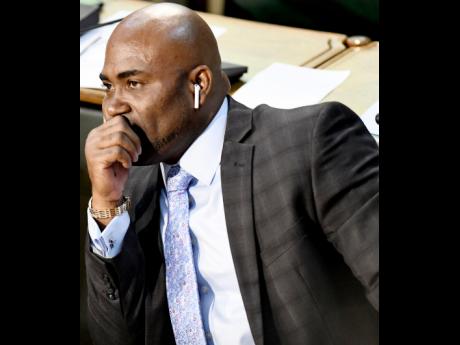Wheatley's woes grow! - Former energy minister says AG's findings left him hurt, humbled and backing calls for forensic probe into $5.2b oil loss
Dr Andrew Wheatley, who held the energy portfolio for most of the past two years, has expressed disappointment and pain at the damning findings by the Auditor General's Department (AGD) into the operations of Petrojam.
According to Wheatley, while the report did not point to any direct wrongdoing on his part, the findings of wanton disregard for the rules and the lax administration on the part of the managers and directors of the state-owned refinery have left him feeling hurt.
"I embrace the AG's report which gives us, probably for the first time, an intimate knowledge of what was going on at Petrojam, and it speaks to an inherent weakness in the operations of the entity," Wheatley told The Sunday Gleaner in his first public interview since the release of the damning report last week.
"The audit covered a five-year period from 2013 to 2018 and showed that the weaknesses uncovered were even before 2013. That systemic weakness is something that we need to address. I believe that the audit provides the opportunity for us to put the right systems in place, not only at Petrojam, but all across government entities," added Wheatley, who was given the energy portfolio after the Jamaica Labour Party's victory in the 2016 general election.
With the AGD reporting that an inadequacy in the established oversight mechanism was demonstrated by the failure of the Petrojam board of directors, and its subcommittees, to convene regular meetings, and their failure to submit minutes of the board meetings to the ministry, which failed to enforce the reporting requirements, Wheatley has faced strong criticisms since the report was released about his handling of the portfolio.
But he told The Sunday Gleaner that while he accepts some of the criticisms, the fact that the issues were not brought to his attention must be taken into account.
"While I am not going to shy away from taking responsibility, one has to look at it from a balanced perspective. The auditor general's report notes that the minutes are sent to the permanent secretary, and if there are any issues which need ministerial interference those are brought to the attention of the minister.
"Also, there is this delicate balancing act where a minister might be accused of meddling if he is going around and circumventing the established procedures as to when and how he interacts with an agency, having set general policy," added Wheatley.
He argued that in this instance he was not aware of what was happening, and as such could not have taken corrective actions. "But maybe I should have meddled and run the risk of being accused of meddling."
On the vexing matter of the 600,684 barrels of oil valued at $5.2 billion which Petrojam could not account for over the five-year period 2013 to 2018, Wheatley argued that while some loss is expected at any refinery, he requested a report when he became aware of the level of losses.
"The management came up with different explanations, including flaring, tank leakage and other issues. But I think there is need for a forensic examination of the losses to understand what happened. I would really support a forensic analysis to unearth the truth as I expressed concern and had requested a report, which I am not sure I received," said Wheatley.
"And if anyone is responsible for the oil losses that person or persons must face the consequences," declared Wheatley.
The former minister also expressed disappointment at the instances of nepotism and the ignoring of the rules surrounding sponsorship highlighted by the AGD, and charged that these were signs of the system breakdown at the facility.
"I believe that the AGD's report is very timely and we should all thank the auditor general for putting forward this report, which we should use as a working tool to improve operations not only at Petrojam but across all government departments.
"I believe that all the protocols which exist must be followed despite whatever position you are in, and there should be no exception. Whatever is unearthed by further investigations, then strong action should be taken," added Wheatley.

